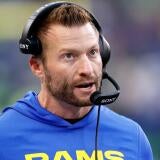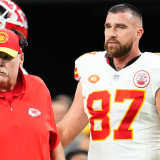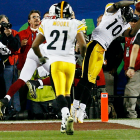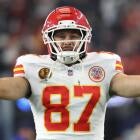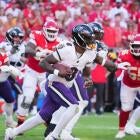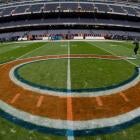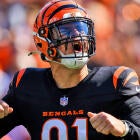Ranking the Super Bowls played in Tampa: Marcus Allen's MVP, Giants' thriller, Steelers' sixth ring highlight
Sunday's Chiefs-Bucs battle will be the fifth Super Bowl played in Tampa

Super Bowl LV will be the fifth Super Bowl played in Tampa. The first two were played at Tampa Stadium, and the last two were played at Raymond James Stadium, the site for this year's Super Bowl.
The first four Tampa Super Bowls included a shocking blowout, a one-point thriller, a defensive-dominated blowout, and an epic, last-minute, game-winning touchdown catch. Here's a more thorough look at the first four Tampa Super Bowls. We've also ranked each Super Bowl ahead of Sunday's fifth Big Game in Tampa.
Super Bowl LV is almost here, and you can watch it for free on the CBS Sports App.
1. Super Bowl XXV: Giants 20, Bills 19
The only Super Bowl to be decided by a single point, the Giants upset the favored Bills on Jan. 27, 1991. After falling behind 12-3, the Giants embarked on 10- and 14-play touchdown drives to take a 17-12 third quarter lead. When they finally got back on the field, the Bills' offense quickly responded. Thurman Thomas, who amassed 190 all-purpose yards, rumbled for a 31-yard score on the first play of the fourth quarter. The Giants then used another long, 14-play drive that ended with Matt Bahr's go-ahead field goal.
The teams then traded punts before the Bills took over at their own 10-yard-line with 2:16 left. With New York's defense expecting pass, the Bills relied on their legs to get into field goal range. Jim Kelly ran three times, while Thomas' runs of 22 and 11 yards brought Buffalo to New York's 29-yard-line with eight seconds left. That set the stage for kicker Scott Norwood, whose 47-yard, game-winning attempt ... sailed wide right.
The Giants won despite playing with a backup quarterback (Jeff Hostetler) and a backup running back (Ottis Anderson). Anderson, a former Pro Bowler with the Cardinals, became the oldest running back to be named Super Bowl MVP. The 34-year-old rumbled for 102 yards and a touchdown while helping the Giants set a Super Bowl time of possession record (40:33). The Giants' game plan has lived on in history. New York's ball control offense was perfectly complemented by New York's defensive game plan, led by defensive coordinator Bill Belichick. The game plan called for the Giants to allow Thomas to have success while instead focusing on stopping Jim Kelly and the Bills' vaunted passing attack. When the Bills' receivers did catch the ball, they were met with physical punishment.
2. Super Bowl XLIII: Steelers 27, Cardinals 23
This was a surprising classic played on Feb. 1, 2009. After a strong start that included James Harrison's 100-yard interception return for a touchdown, the Steelers held a 20-7 lead midway through the fourth quarter. The Cardinals, a 9-7 outfit during the regular season, made it a game when Kurt Warner hit Larry Fitzgerald for a 1-yard score. The Cardinals inched closer when a Pittsburgh penalty resulted in a safety with 3:04 remaining.
With their deficit cut to just four points, the Cardinals took their first-ever Super Bowl led when Warner hit Fitzgerald on a crossing route. Fitzgerald, who had just one catch for 12 yards during the game's first three quarters, out-ran Harrison and Troy Polamalu en route to a 64-yard score with 2:47 to play.
After a penalty pushed the Steelers to their own 12-yard-line, Ben Roethlisberger looked to Santonio Holmes, whose 11 and 13-yard catches helped get his team to midfield. His 40-yard catch-and-run set the stage for his game-winning, six-yard touchdown catch with 42 seconds left. Holmes managed to just get both feet in bounds while securing the catch. The Steelers clinched their sixth Super Bowl win when LaMarr Woodley strip-sacked Warner on Pittsburgh's 44-yard-line.
3. Super Bowl XVIII: Raiders 38, Washington 9
The first Super Bowl played in Tampa (Jan. 22, 1984), this was the second-biggest upset in Super Bowl history at that time. After beating the Dolphins in the previous Super Bowl, Washington was held completely in check by a Raiders team that had already won two Super Bowls over the previous seven years. The Raiders' defense, led by cornerbacks Mike Haynes and Lester Hayes, shut down Washington's talented receiving corps. The Los Angeles offense was led by game MVP Marcus Allen, who rushed for a then Super Bowl record 191 yards. His 74-yard touchdown run stood as the longest in Super Bowl history for 22 years.
4. Super Bowl XXXV: Ravens 34, Giants 7
This one (Jan. 28, 2001) was mostly a snooze fest sans a crazy 36-second sequence late in the third quarter. With the Ravens already ahead 10-0, Duane Starks' pick-six of Kerry Collins gave Baltimore a 17-0 lead. On the ensuing kickoff, Ron Dixon's 97-yard return cut the deficit back to 10 points. The Giants' reprieve did not last, however, as Jermaine Lewis ran the ensuing kickoff 84 yards for a score. The Ravens won their first title, while the Giants became the third team to not score an offensive point in the Super Bowl.



